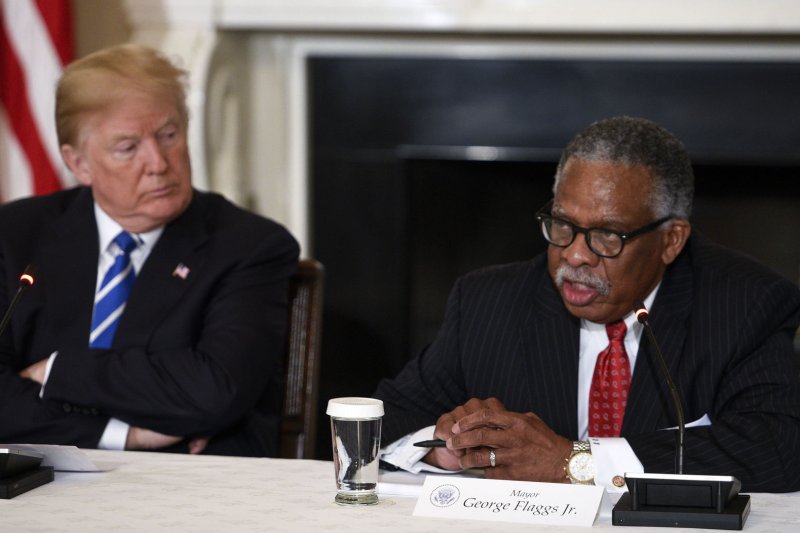1 of 7 | President Trump listens as Vicksburg, Mississippi, Mayor George Flaggs Jr. speaks during a meeting with State and local officials about his infrastructure initiative in the State Room on Monday. Photo by Leigh Vogel/UPI |
License Photo
Feb. 12 (UPI) -- The 2019 budget released by the White House Monday calls for more military spending, funding for a wall on the U.S.-Mexico border and cuts to social programs -- and adds about $7 trillion to the national deficit over the next decade.
The 160-page budget calls for increased defense spending -- and cuts to a number of domestic and social programs, including entitlements like Medicare, which would lose more than $550 billion over the next ten years under the plan.
Trump's proposal projects a gap between tax revenue and spending amounting to at least $7 trillion by 2026. Largely because of the tax cut, $2 trillion of additional debt is anticipated for 2019 and 2020 alone. Last year, the White House projected a budget surplus of $16 billion could be reached by 2027.
The budget also projects a tax receipt shortfall of $314 billion in 2018, and a $400 billion deficit in 2019.
The government is forecast to save $47 billion over 10 years, as Medicare recipients pay for a higher percentage of their medication. It calls for a $214 billion cut from the Supplemental Nutrition Assistance Plan, and a reorganization of government which potentially eliminate duplicating programs.
A short time earlier, the White House also revealed its long-awaited $1.5 trillion infrastructure plan, which will now be sent to Congress.
The budget seeks to repair and replace U.S. highways, bridges and airports by committing $200 billion in federal funding during the next decade. Grants to secure local and private funding account for $100 billion of the plan. Another $50 billion will go toward rural needs, to be determined by each state, and $20 billion is reserved for what the plan calls "technical assistance for bold, innovative, and transformative infrastructure projects that could dramatically improve infrastructure."
"We will build gleaming new roads, bridges, highways, railways, and waterways all across our land. And we will do it with American heart, and American hands, and American grit," Trump said.
"Trucking companies are complaining that they used to take trucks from Los Angeles to New York and there was no damage. Now they bring [them] from Los Angeles to New York and there's tremendous damage to their trucks because our roads are in bad shape and we're going to get the roads in great shape."
Much of the $200 billion will be found in cuts to federal transit programs and to the Department of Transportation's Transportation Investment Generating Economic Recovery grant program, which offers funding based on the needs of applying communities.
Trump's budget includes $23 billion for border security and immigration enforcement -- including the construction of a wall -- and $17 billion to fight the opioid epidemic.
Congress now must approve the president's budget plan, where it is expected to find some resistance. Since 60 Senate votes will be required for approval, the budget will need some Democratic support.















